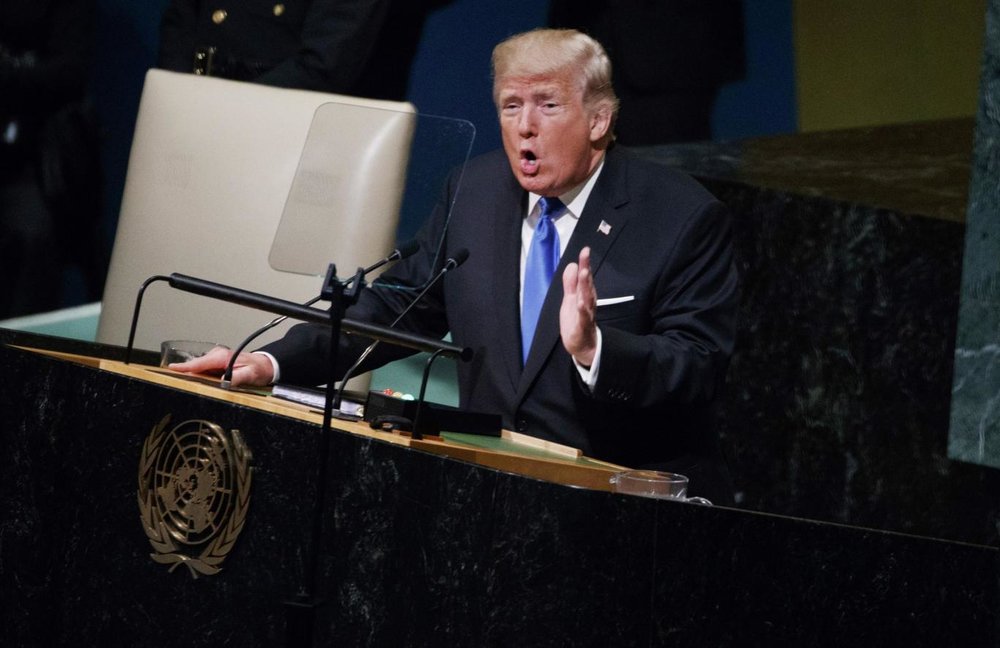A scenario: Iran’s economy in the absence of nuclear deal

In his first speech to the United Nations General Assembly on Tuesday, U.S. President Donald Trump called the nuclear deal with Iran “an embarrassment to the United States” that should be revisited.
The nuclear deal, officially called Joint Comprehensive Plan of Actions (JCPOA), has been subject to threat since Donald Trump became the U.S. president in January. He has stated repeatedly that the agreement should be renegotiated or even called off, however getting no support from other signatories -China, France, Germany, Russia, the UK, and the European Union – he has not been able to act on his words so far.
Trump’s recent remarks at the general assembly have raised new doubts about U.S. sticking to the accord more than ever. Now the question is what will happen if Trump blows the nuclear deal, and what will be the consequences for Iran’s economy.
Effects on Iran’s banking relations
There are already some U.S. sanctions remained in place, most of which are affecting the country’s open banking relations with foreign trade partners. Many international banks are already banned from or are cautious of direct involvement with Iran. By repeatedly disapproving the nuclear accord, Trump has already spread a sense of uncertainty about Iran’s economy making it harder for international banks to have direct communication with Iranian banking system; so even if U.S. won’t comply with the nuclear deal, Iran’s banking situation will not change drastically.
However, regardless of all that has been said, a look at the changes in Iran’s position among the world economies indicates that Iran’s market with its great potentials has been too attractive to resist for many foreign investors. Despite U.S. sanctions, foreign companies and business delegations have been flocking to Iran seizing opportunities to clinch deals in different areas.
Although banking relations and financial issues have posed barriers in the way of trade with Iran’s economic partners, foreign companies are taking different measures to maintain trade with the Islamic Republic.
Earlier this month, Central Bank of Iran (CBI) Governor Valiollah Seif announced that Iran expects several credit lines to be opened for the country in near future.
The governor’s remarks came after China Development Bank (CDB) signed a memorandum of understanding (MOU) with CBI for opening a €15-billion credit line to fund a wide range of infrastructure and production projects in the country. Iran has earlier secured a $10-billion credit line from the Chinese state-owned CITIC investment company to be allocated to several banks in Iran.
The Chinese credit lines will use Euros and Yuan to bypass the U.S. sanctions.
Seif said in August that three European countries including Austria, Denmark and Italy are also set to open €22 billion credit lines for financing projects in Iran which should be added to the €8-billion credit line secured by South Korea’s Eximbank.
Agreements and deals
The implementation of the nuclear deal in January 2016 led to the removal of sanctions against Iran, allowing the country to sign a large number of deals with foreign companies in many different areas.
Purchases of commercial aircrafts from Airbus, Boeing and a number of other companies are among the greatest deals inked post sanctions.
Iran’s flag carrier, Iran Air, signed a contract with Boeing for purchasing 80 airplanes from the American manufacturer. The company also finalized an $18 billion deal with France-based Airbus for 46 Airbus A320 planes, 38 A330 planes and 16 A350 XWB aircrafts. Also, Iran’s Aseman Airlines sealed a deal with Boeing on purchasing 60 aircrafts.
When In November, U.S. Congress voted to block sales of commercial aircrafts to Iran, Head of the Civil Aviation Organization of Iran Ali Abedzadeh stated that all of Iran’s deals including the one with Boeing have been signed at an international level in compliance with the Joint Comprehensive Plan of Action and approved by the United Nations so the companies will be committed to deals; It seems that it will be the case even if the nuclear deal goes off.
Iran has also signed a $4.8-billion deal with the French energy major Total in July for developing phase 11 of Iran’s supergiant South Pars gas field (shared with Qatar in the Persian Gulf).
This landmark deal was signed between National Iranian Oil Company (NIOC) and a consortium comprising France's Total, China's CNPC International and Petropars Company from Iran.
After signing the deal, Total Chief Executive Officer Patrick Pouyanne said, for Total, the risks are worth the potential rewards of signing a 20-year agreement.
“I will come back to Iran again because this contract is the first of many,” he added.
Iranian energy officials predict that another four or five energy companies will follow with investment agreements in the next year. Royal Dutch Shell Plc and Eni SpA are already in talks on developing local fields.
Regarding other areas, world renowned carmakers are also taking the risk of entering Iran’s market, France’s Peugeot SA was the first carmaker to re-enter the country in 2016, Volkswagen followed Peugeot after a 17-years absence, to offer Tiguan compact SUVs and the Passat family car to the country.
On the other hand, Russian and Chinese companies have already cemented trade relations with Iran and as key Iranian allies they have proved themselves to stay in the country even during the sanctions era.
All and all, even if Trump wants to desert the deal, he would need to have the support of many key players like Russia, France, and China, something which appears to be too hard considering their positive attitude toward Iran’s nuclear accord.
During his speech at the UN general assembly, French President Emmanuel Macron contradicted Trumps remarks saying that nations are not strong acting alone. He called the nuclear deal “robust” and said “to put it into question without proposing anything to replace it is a grave error.”
Leave a Comment